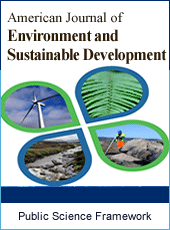American Journal of Environment and Sustainable Development
Articles Information
American Journal of Environment and Sustainable Development, Vol.2, No.4, Dec. 2017, Pub. Date: Dec. 21, 2017
There Is No Indication That the Extreme Water Levels in Rhode Island Have Strongly Accelerated Since the Start of the 20th Century
Pages: 37-42 Views: 2336 Downloads: 438
[01]
Albert Parker, Formerly College of Science and Engineering, James Cook University, Townsville, Australia.
In Rhode Island, the extreme water levels vs. the mean sea level (MSL) trend are not increasing, while the frequency of hurricanes is reducing. The MSL trend is only apparently accelerating at a rate exceeding the few micrometers per year squared of the averages of world tide gauges’ data sets only because of the local phasing of the multi-decadal oscillations. With proper time windows, the acceleration is negligible as everywhere else. There are therefore no accelerating extreme water levels.
Sea Level Rise, Sea Level Acceleration, Cherry Picking
[01]
Raposa, K. B., Weber, R. L., Ekberg, M. C. and Ferguson, W., (2017), Vegetation dynamics in Rhode Island salt marshes during a period of accelerating sea level rise and extreme sea level events. Estuaries and Coasts, 40(3), pp. 640-650.
[02]
Parker, A. & Ollier, C. D. (2017), CALIFORNIA SEA LEVEL RISE: EVIDENCE BASED FORECASTS VS. MODEL PREDICTIONS, Ocean & Coastal Management., In Press, Corrected Proof. doi: 10.1016/j.ocecoaman. 2017. 07. 008.
[03]
Chambers, D. P., Merrifield, M. A. & Nerem, R. S. (2012). Is there a 60 year oscillation in global mean sea level?. Geophysical Research Letters, 39(18).
[04]
Douglas, B. C. (1991), Global sea level rise. Journal of Geophysical Research: Oceans, 96(C4), pp. 6981-6992.
[05]
Mörner, N.-A. (2017), Sea Level Manipulation, International Journal of Engineering Science Invention, 6(8): 48-51.
[06]
Parker, A., Saleem, M. S. & Lawson, M. (2013), Sea-level trend analysis for coastal management. Ocean & coastal management, 73, pp. 63-81.
[07]
Parker, A. (2013a), Sea level trends at locations of the United States with more than 100 years of recording. Natural Hazards, 65(1), pp. 1011-1021.
[08]
Parker, A. (2013b), Oscillations of sea level rise along the Atlantic coast of North America north of Cape Hatteras. Natural Hazards, 65(1), pp. 991-997.
[09]
Parker, A. (2014), Apparent hot and cold spots of acceleration along the Atlantic and Pacific coasts of the United States. Nonlinear Engineering, 3(1), pp. 51-56.
[10]
Parker, A. & Ollier, C. D. (2016), Coastal planning should be based on proven sea level data. Ocean & Coastal Management, 124, pp. 1-9.
[11]
Parker, A. (2016), Frequency of Hurricanes' Driven Floods not Increasing Under Global Warming, Journal of Earth and Atmospheric Sciences, 1(2), pp. 44-59.

ISSN Print: Pending
ISSN Online: Pending
Current Issue:
Vol. 6, Issue 4, December Submit a Manuscript Join Editorial Board Join Reviewer Team
ISSN Online: Pending
Current Issue:
Vol. 6, Issue 4, December Submit a Manuscript Join Editorial Board Join Reviewer Team
| About This Journal |
| All Issues |
| Open Access |
| Indexing |
| Payment Information |
| Author Guidelines |
| Review Process |
| Publication Ethics |
| Editorial Board |
| Peer Reviewers |


